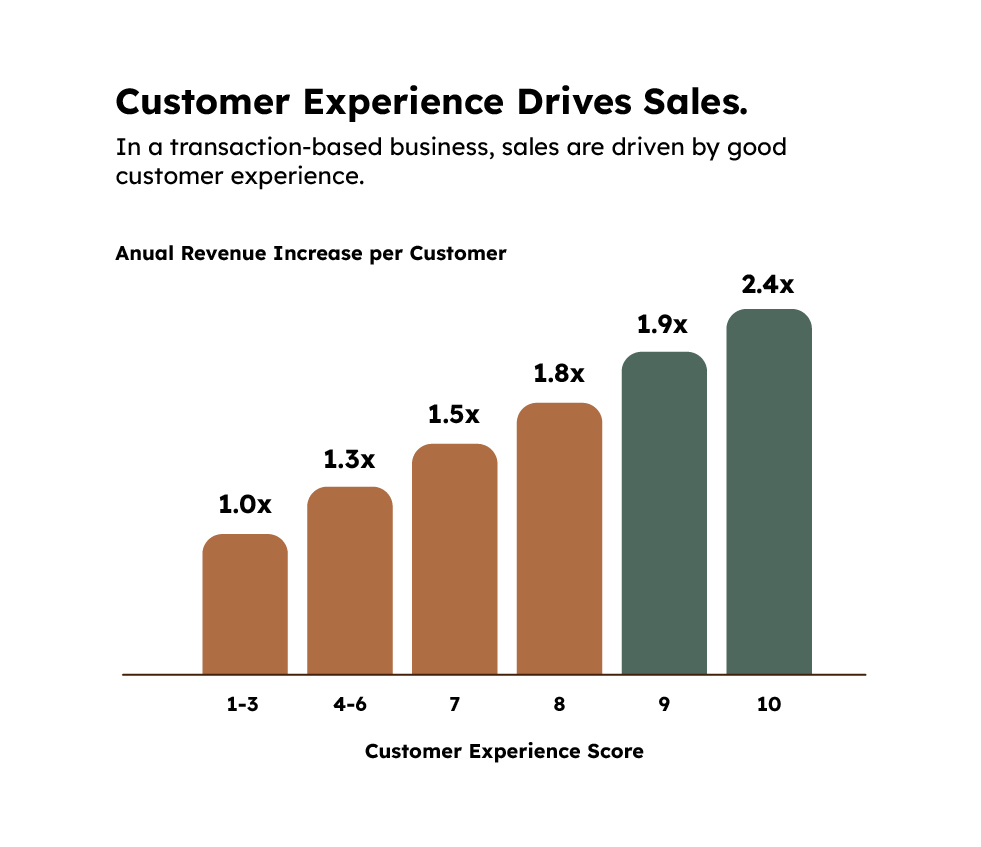Our office will be closed on Thursday 25th and Friday 26th April. If your matter is urgent please log a ticket via the Client Support button.

89% of organisations now compete on the basis of customer experience alone, which is unsurprising when 74% of customers are at least somewhat likely to purchase based on that too. So, it’s no wonder that customer experience tops the priority list for many organisations.
The return on investment (ROI) organisations can expect on a DXP will depend on the nature of the specific organisation. That said, those that invest in an architecturally advanced and feature-rich solution can expect measurable improvements in five key areas; revenue growth, loyalty and lifetime customer value, time to market, team efficiency and collaboration, and cost savings.
1. Revenue growth
DXPs empower companies to deliver highly personalised customer experiences that resonate with visitors, nurture leads, and boost conversions. McKinsey reports that brands that improve the customer journey see revenues increase by as much as 15%. An interesting study by the Harvard Business Review found that customer experience is a major driver of revenue as customers who have had the best experiences spend 140% more compared to those who had the poorest.

2. Loyalty and lifetime customer value
The sophisticated personalisation capabilities and holistic customer profiles of a DXP all combine to enable organisations to design and deliver deeply relevant and engaging experiences to each and every customer.
And thanks to its multichannel capabilities, organisations can optimise each touchpoint to deliver consistent experiences wherever customers are (web, mobile, e-commerce, social, chatbots, voice search, customer portals, kiosks…).
Customer experience drives over two-thirds of customer loyalty — more than brand recognition and price combined. 65% of customers would stay long-term with a brand that provided a positive experience throughout an entire customer journey.
3. Reduced time-to-market
A DXP not only speeds up development time to get websites live faster but brings more business agility, helping organisations accelerate their time to market with new solutions and initiatives in response to a changing market and trending customer demands.
4. Increased efficiency and collaboration
One of the biggest benefits of a DXP is being able to publish content to all channels at once, all from one place, while gathering even more insights from each channel.
Organisations can create, publish, and adjust content without having to call on developers, benefiting from a low-code/no-code approach, thanks to custom forms, on-page editing, drag-and-drop components, reusable templates, and content tree component-based page building capabilities. And workflows and versioning help organisations stay on top of content, serving the right information to their customers at the right time.
DXPs with easy-to-use marketing automation tools with built-in analytics enable organisations to easily automate and optimise campaigns on any channel.
5. Improved cost savings
Cost savings are a big part of how DXPs set companies up for success. The better in-house efficiency an organisation has, the more it saves resources and employees are more productive and no longer blocked by silos and cross-departmental barriers.
From a technical perspective, for developers, the savings are even more pronounced, as good DXP vendors provide solid roadmaps with frequent releases that include hotfixes, updates, and feature releases. This reduces the overall investment organisations must make in updating their solution if they choose a DXP that is future-proof.
Additionally, unhappy customers can become very expensive in the long run (returns, refunds, bad reviews, complaints). Keeping customers happy with exceptional experiences, therefore, reduces the cost to serve. brands that can improve the customer journey see cost to serve reductions of up to 20%.
About Hicaliber
We are passionate about creating digital platforms for our clients that turn prospects into profits. We develop products that seamlessly connect websites and software systems together with the aim to improve the flow and management of data in any business. Interested?
Related Articles
In today’s rapidly evolving marketing landscape, the importance of rich data cannot be overstated. Brands must not only capture customer…
In today’s fast-paced business landscape, marketing managers face a common and formidablechallenge: bridging the gap between data silos and ensuring…
In the ever-evolving realm of social media marketing, understanding the intricacies of organic algorithms is essential for businesses striving to…
